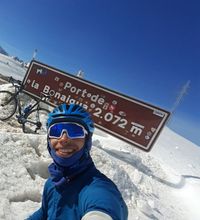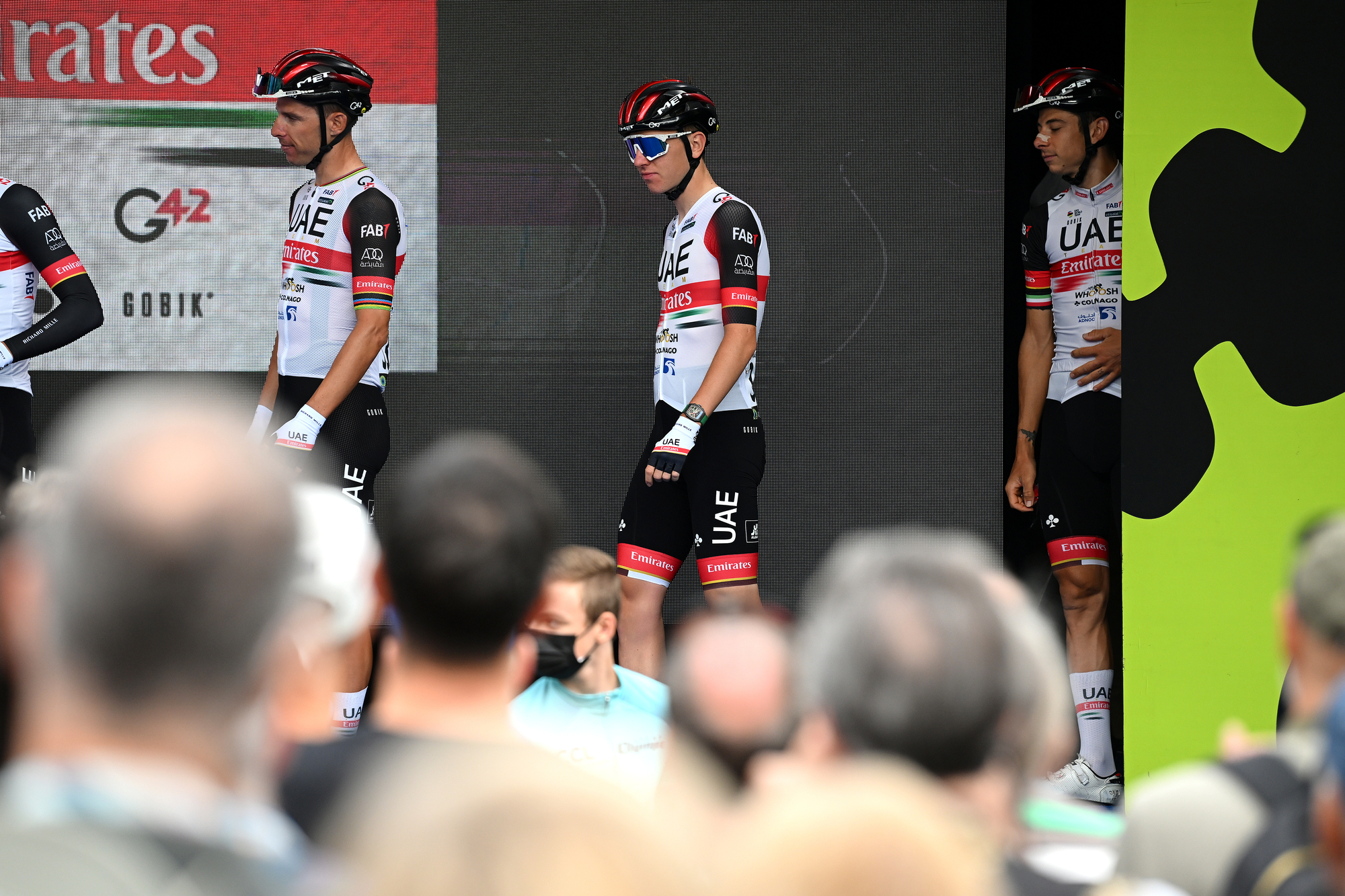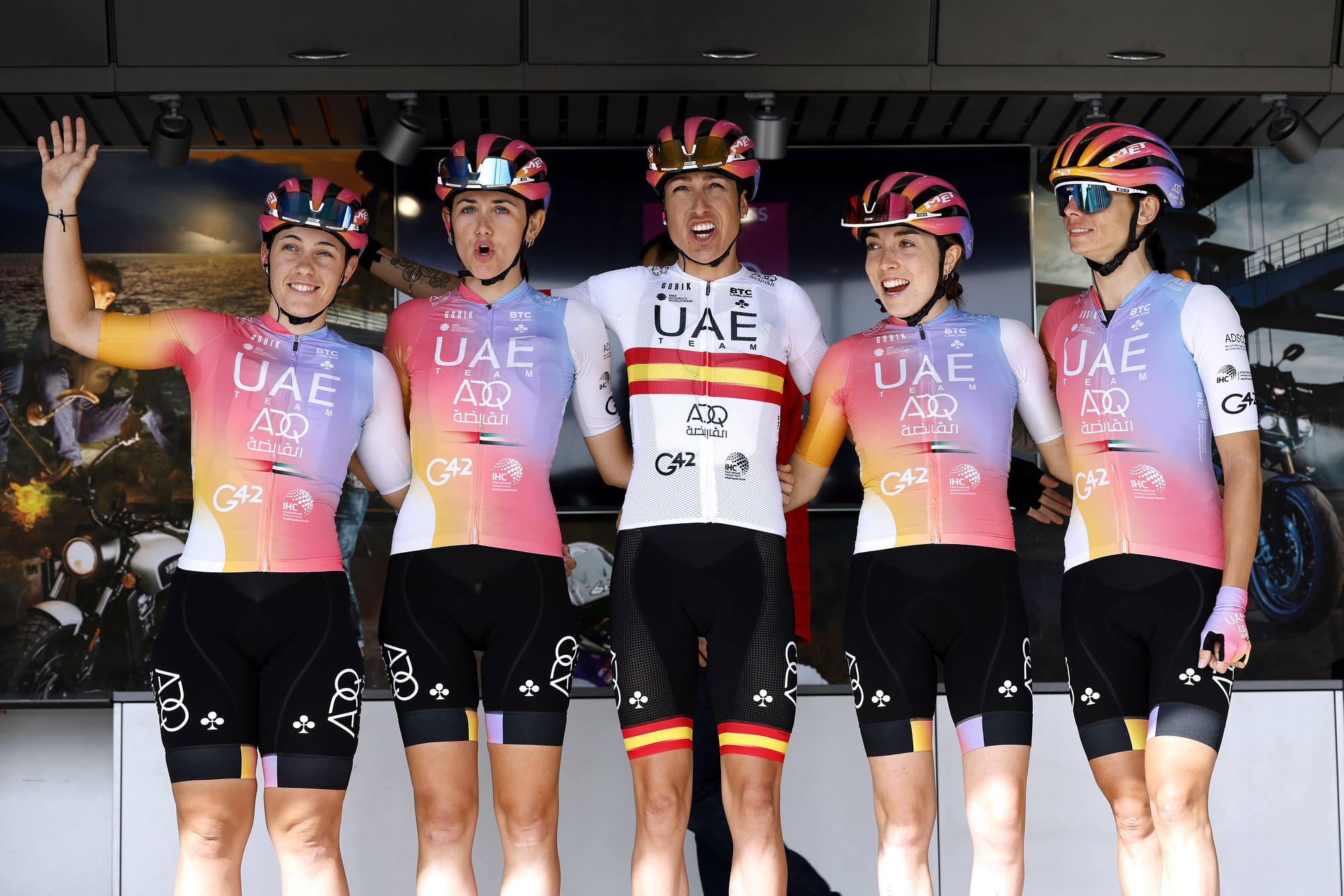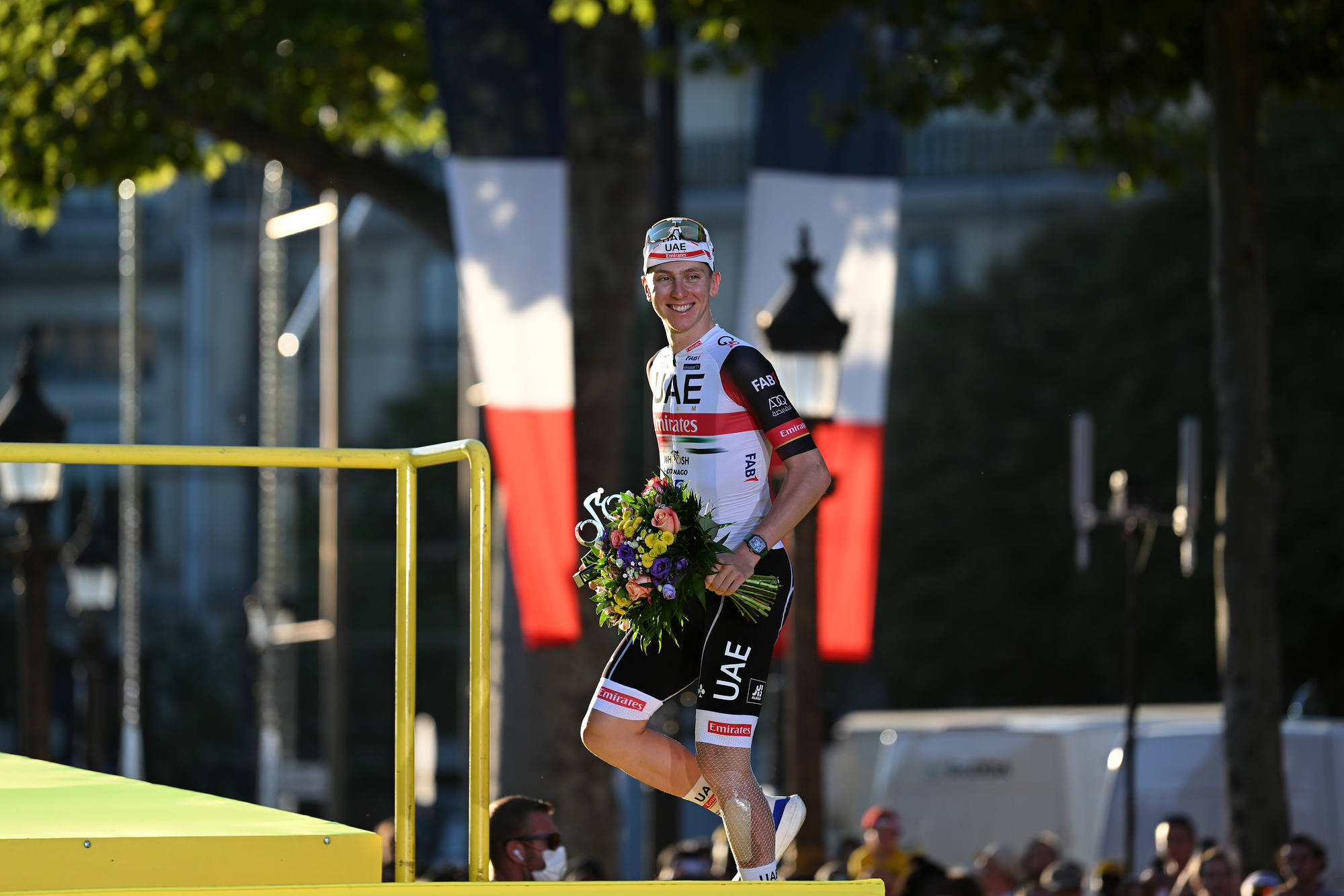'There are serious implications' - Tadej Pogačar's UAE Team Emirates face sanctions threat
Growing pressure on Western governments to sanction UAE over Russia could spell trouble for Tadej Pogačar's team


The latest race content, interviews, features, reviews and expert buying guides, direct to your inbox!
You are now subscribed
Your newsletter sign-up was successful
The future of Tadej Pogačar’s UAE Team Emirates is at risk as pressure grows on Western governments to impose sanctions on the United Arab Emirates for allegedly facilitating the flow of Russian personnel and money during the ongoing war in Ukraine.
Since Russia invaded Ukraine in late February, a reported 275,000 Russians, including individuals sanctioned by the West, have relocated or made frequent visits to the UAE, with some moving their money and assets. Former FBI agent Karen Greenaway told news publication Vox that this “movement of money… allows Russia to continue to run its economy and its war economy.”
In October, the president of the UAE, Sheikh Mohammed bin Zayed al-Nahyan, met Vladimir Putin in St Petersburg where the latter hailed the relations between the two countries as an “important factor of stability” in the world. Contrary to Western nations, the UAE has sought to remain neutral in the war and unlike Western governments, has not introduced sanctions against Russia, nor criticised the invasion.
In a further ratcheting up of tensions, the European Union bowed to requests from some MEPs to add the UAE to the European ‘blacklist’ of high-risk money laundering countries in early November. It follows the Financial Action Task Force, an intergovernmental body, grey-listing the state in the spring, a move that is essentially a warning of bad behaviour.
Meanwhile, British lawyers acting for Ukrainian human rights activists have asked the UK Government to investigate whether members of the state’s ruling royal family and government figures with stakes in Britain should be sanctioned.
The prospect of additional measures being applied has raised questions about what would happen in the cycling world, with companies in the state that are connected to the ruling government owning both the men’s UAE Team Emirates and women’s UAE Team ADQ teams; there are also men’s and women’s WorldTour races in the UAE in February.
One recent former senior official of cycling's governing body, the UCI, speaking on the condition of anonymity, told Cycling Weekly that the UCI and its president David Lappartient faces a difficult decision on how to act should the UAE be sanctioned.
The latest race content, interviews, features, reviews and expert buying guides, direct to your inbox!
“Cycling has teams sponsored by the UAE and money coming in from corporate sponsors, so I think if the UAE are going to be specifically sanctioned for their links to Putin’s Russia, it would give the UCI difficulties,” the former official said.
“What would they do with the UAE men’s team, one of the top-ranked teams with Pogačar, and one of the most well-funded teams? There are some serious implications for the team and others.
“It was relatively easy for them to deal with Russia, Belarus and the Gazprom team, etc. But a big team like UAE, and a WorldTour event like the UAE Tour, are pretty significant elements at the top level of men’s pro cycling. There is a big issue here that will be difficult for them to deal with.”
UAE Team Emirates is registered in the UAE, although UCI licence holder CGS Cycling has a Swiss address.
What are the links between the UAE government, Russia and cycling?

UAE Team Emirates are sponsored by a number of UAE companies, including the Emirates airline that has continued with daily, direct flights between Moscow and Dubai.
ADQ, the title sponsor of the women’s team and a backer of the men’s outfit, is a sovereign wealth fund that has been described as using soft power around the Arab region to buy commercial assets. Its chairman is the state’s national security advisor Sheikh Tahnoon bin Zayed Al Nayhan, who is also the brother of the country’s president, Sheikh Mohammed bin Zayed Al Nahyan.
Sheikh Tahnoon also chairs the Abu Dhabi-based private investment fund Chimera Investments LLC, which in 2020 bought Colnago, maker of the bikes used by both UAE teams.
Other sponsors of the men’s team include the property companies Emaar and Yas Park Gate. Between July and September, Russians bought more property in the UAE than any other nationality.
How would the UCI respond?
The 18-person UCI management committee includes Osama Ahmed Abdullah Al Shafar, the head of the Asian and UAE cycling federations who also sits on the UAE’s Federation National Council, a parliamentary body that is responsible for examining and amending all proposed federal legislation in the state.
On November 19, Mr Al Shafar posted an Instagram photo with the sanctioned Russian oligarch Makorov, who continues to sit on the same UCI management committee. “With my dear brother Igor Makarov,” read the photo’s caption.
Mr Al Shafar’s presence on the board would complicate the UCI’s decision making should they be forced to act, the unnamed former official said. “In the case of the UAE, Osama Al Shafar will definitely have an impact on this. I imagine he would be very keen on influencing the way that this went. They [the Asian Cycling Federation] are going to lobby international bodies to keep out of this sort of thing.”
Cycling Weekly sent multiple emails to Mr Al Shafar, none of which received a response.
Una publicación compartida de Osama AlShafar (@osamaalshafar)
A photo posted by on
Two members of the management committee responded to Cycling Weekly’s request for an interview. Czech Katerina Nash said: "It’s crucial to understand that the UCI is not a political organisation.”
In an email, she added: “I’m not able to speak about any details on this situation since MC [the management committee] doesn’t deal with day-to-day events. Our next meeting will be in January. You would need to contact the legal department at the UCI.
“I do know [that the] UCI would act immediately if there was any danger for the athletes travelling and racing in [the] UAE or if the NF [national federation] was corrupt and not following the rules. [The] Mexican Federation (FMC) is a good example of that.” Following the mismanagement of the Tokyo Olympics selection process, the FMC were suspended by the UCI in 2021 for “serious infringements of obligations… in particular when it comes to governance and the electoral processes.”
Dane Henrik Jess Jensen, also on the committee, said that “In [the] UCI we have the governance that Q&As to the UCI body are to be answered by the president or general director.” When it was put to him that it was disappointing he felt silenced, he responded in an email: “There are always pros and cons, but I have to respect the UCI governance.”
When questions were put to the UCI, a spokesperson pointed to the body's existing rules around sanctions on Russians, and said it would "continue to monitor the situation" in Ukraine.
Who is Igor Makarov?
Igor Makarov is a Russian oligarch with an estimated net worth of $2.1 billion. A former Soviet Union cyclist, Makarov founded the ITERA Oil and Gas Company in 1992.
In 2011 he became a member of the UCI’s management committee but this April he was sanctioned by the Australian and Canadian governments, with the latter describing him as a “close associate of the Russian regime.”
In October, the UCI president David Lappartinent confirmed that Makarov was still a member of the management committee, saying: “We’re aligned with the IOC position, which is that Russian teams and riders are not to take part in any competitions. However, the Russian or Belarus Olympic committees are not suspended, so neither are their national federations and their officials.”
Makarov has repeatedly denied that he has ties with Vladimir Putin.

UAE Team Emirates' Tadej Pogačar, the number one ranked male rider in the world, finished second at this summer's Tour de France
In the event of sanctions, one former UCI official informed CW that the UCI would take its lead from the International Olympic Committee (IOC). They said: “I think in terms of international relations it’s best to act in unity and best to have the power of the international body making a decision. You’re heading for trouble if you do something unilaterally.
“I think there would be a debate, a discussion, possibly meetings with organisations such as the IOC to try and get some feeling for what would be the most appropriate response for all of the sports, rather than just making an individual case. That’s what Lappartient will be looking at doing.
“The most likely situation is that the UCI management committee members would be reactive on things like this, rather than proactive.”
The president of the Ukrainian Cycling Federation, Andriy Grivko, has repeatedly praised the actions of the UCI since the outbreak of the war and backed the governing body to continue to stand by Ukraine.
He told CW: “This question is political. It’s better to ask the question to the Olympic Committee [because] everybody knows the international federations follow the decisions of Thomas Bach [the IOC president].
“What I see is that in comparison to other sports, the cycling federation have done pretty good sanctions."
When CW contacted the IOC, a spokesperson said: "The mission of the IOC and the Olympic Games is to unite the entire world in peaceful competition." They went on to point out that the IOC always tried to remain neutral in global conflicts.
Both the UCI and UAE-Team Emirates declined to provide a statement, while the UAE Tour and UAE Team ADQ did not respond.
A freelance sports journalist and podcaster, you'll mostly find Chris's byline attached to news scoops, profile interviews and long reads across a variety of different publications. He has been writing regularly for Cycling Weekly since 2013. In 2024 he released a seven-part podcast documentary, Ghost in the Machine, about motor doping in cycling.
Previously a ski, hiking and cycling guide in the Canadian Rockies and Spanish Pyrenees, he almost certainly holds the record for the most number of interviews conducted from snowy mountains. He lives in Valencia, Spain.
